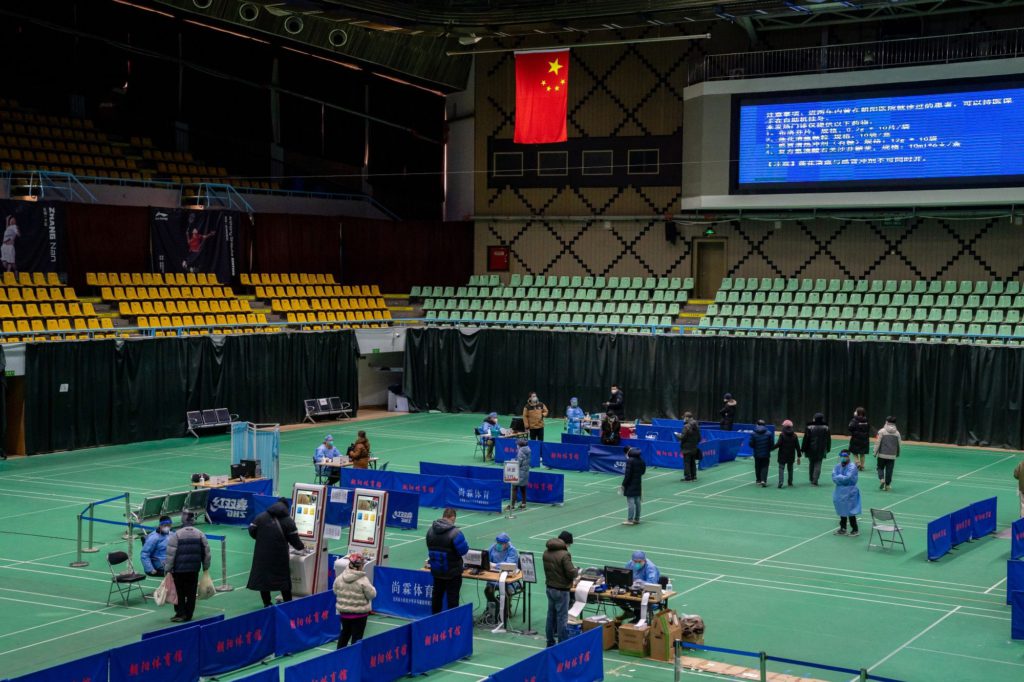Chinese workers with mild Covid are being told to go back to work in some cities, evidence of a complete reversal in the way the virus is being viewed as officials seek to limit the economic impact of an explosion in cases as the country reopens.
(Bloomberg) — Chinese workers with mild Covid are being told to go back to work in some cities, evidence of a complete reversal in the way the virus is being viewed as officials seek to limit the economic impact of an explosion in cases as the country reopens.
Government workers in the western metropolis of Chongqing were told to continue working if they were asymptomatic or experiencing mild Covid symptoms, authorities said at the weekend. Officials in Zhejiang, a manufacturing hub on China’s east coast, and a city in the nearby province of Anhui, also green-lit Covid-positive people working this week, according to local media reports.
The moves come just weeks after the country abruptly abandoned its stringent Covid Zero regime, plunging headlong into reopening despite lagging vaccination rates and colder weather. The shift has been accompanied by a wave of infections in major urban centers, with Beijing bearing the initial brunt of what experts predict will be a tsunami of Covid cases across the vast nation.
Still, the government’s plan seems to be to weather the initial reopening wave quickly, and get the economy — hobbled by months of crippling lockdowns, mandatory quarantines and testing — back to consistent growth.
China’s Reopening Is a Risky Bet Beijing Can Control Narrative
Allowing Covid-positive people to work, especially in factories, will no doubt fuel the spread. Yet, some companies are willing to run that gauntlet, especially if their younger workforces don’t get too sick.
Incentive to Keep Working
Most of the front-line workers at Peter Yu’s factory that makes vehicles in Hubei province, central China, are still working with mild symptoms. The employees are paid by the number of products they make, he said, so there’s an incentive to keep working even if they’re infected. Given China has largely dismantled its once ubiquitous PCR testing system, the company only knows if a worker is Covid positive if they self report.
“For our company, the production capacity is really important — stopping for even just a day means a big loss,” Yu said. “If they self-report, we will recommend they stay at home and recover. But the real situation is that many workers are infected, they don’t have serious symptoms, they choose to continue to work and not report their cases.”
It belies the more cautious approach deployed in other countries as they shifted from eliminating Covid to living with it. Most places had rules in place around when a Covid-positive person — or anyone even exposed to the virus — could go out in public and enter workplaces. Those curbs were aimed at flattening the curve and minimizing the hit to hospitals as the virus circulated.
Downplaying Covid
China has had to build makeshift fever clinics in Beijing after the first days of wider spread saw hospitals overwhelmed with infected people. Official propaganda has since focused on downplaying the severity of Covid and telling people to ride it out at home if they can — a total about-turn from how the virus was portrayed in China over the past three years.
Now, with the initial case explosion appearing to ease off, Beijing is telling workers they don’t need to prove they are negative to return to the workplace, as long as they’ve done a week of home isolation.
Other businesses in China are still trying to limit spread within their factories, with crucial year-end production targets in sight. German carmaking giant Volkswagen AG is asking Covid-free workers to work longer hours at one of its factories in southern China, with a raft of employees out sick with Covid.
VW Tells Staff in China to Work More Hours as Covid Spreads
SES AI Corp., which develops lithium-metal batteries for electric vehicles, is also trying to keep its manufacturing facility running in Shanghai. The plant there has around 100 staff and the majority have caught Covid, a spokeswoman said Wednesday. To keep the site running, SES is splitting workers’ shifts, with Covid-infected employees going to work on Mondays, Wednesdays and Fridays and non-infected staff working Tuesdays and Thursdays.
Companies such as Apple Inc supplier, Foxconn Technology Co., and carmaker Geely are keeping their workers in closed loops as the Covid wave spreads. The systems see employees confined to the factory campus and tested regularly to keep the virus out.
Reopening has been accompanied by staff shortages and reduced output for businesses in other parts of the world, and the expectation is that China will have a similar experience, at a much greater scale, as it scraps Covid Zero. Mass absenteeism and delays in the world’s second-largest economy could have significant implications for supply chains and global growth.
End of Covid Zero Risks Overwhelming China With Infections
Encouraging mild or asymptomatic cases to work may help mute that impact to some extent, but would also supercharge the outbreak — leading to more cases, and likely deaths.
One advantage of reopening at this time of year is that it’s typically slow for some industries in China.
Some 60% of factories across the industrial hubs of Guangdong, Zhejiang and Shandong plan to send workers for longer vacation around the end of this month, as they wait for new orders to come in in the new year. Covid outbreaks also saw some plants close early for the Lunar New Year holidays, which fall at the end of January, according to China’s Futures Daily.
–With assistance from Danny Lee and Kathy Chen.
(Updates with another factory’s experience from 12th paragraph.)
More stories like this are available on bloomberg.com
©2022 Bloomberg L.P.










